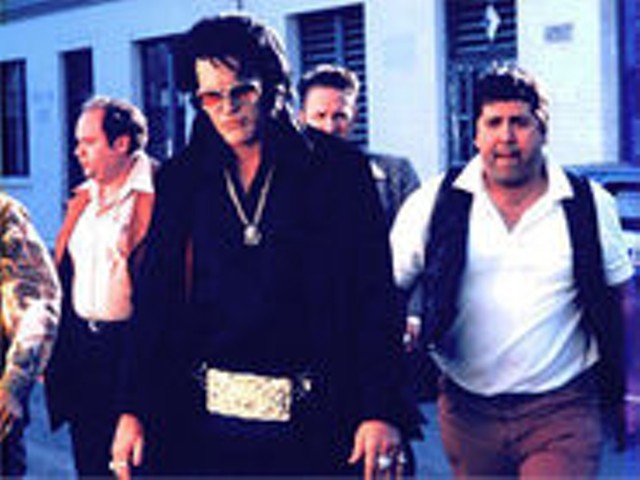Lost in Stardust is the poetry of Gaiman's writing ("His fingers touched the chain that bound them: cold as snow it was, and tenuous as moonlight on a millpond or the glint of light on a trout's silver scales as it rises at dusk to feed"), replaced only by brute-force storytelling — quick, from Point A to Point B! Still, Gaiman's story is sturdy enough to survive, for the most part, the whittling, flaying and butchering of writers Jane Goldman and Matthew Vaughn, the latter of whom also directed after most recently baking Layer Cake with cocaine and gristle.
Gaiman's story is as old as papyrus itself — a quest tale in which a young man named Tristan (the incredibly generic Charlie Cox) must endure myriad perils — among them duplicitous kings, vengeful witches and lightning-collecting pirates — in order to fetch a fallen star that's the object of his alleged True Love's deepest desires. (The True Love in this instance is played by Sienna Miller, who recently proved in Steve Buscemi's hysterically overwrought Interview she's capable of getting any man to do or say anything, no matter how utterly ridiculous the request.)
Alas, the star's far more than a radiant rock; she's a girl called Yvaine, played by Claire Danes, who's furious about her new earthbound digs and far more woman than our hero's shallow temptress. But Tristan's not the only person in the fantasyland of Stormhold seeking the star: Also on her trail are a trio of aging witches — chief among them Lamia (Michelle Pfeiffer), who must devour Yvaine's heart before her brittle bones and brutally weathered visages completely disintegrate — and two would-be kings, Primus (Jason Flemyng) and Septimus (Mark Strong), who need Yvaine's glowing necklace before they can take their father's throne.
No doubt Stardust will accrue many comparisons to Rob Reiner's The Princess Bride, but Vaughn's variation on the theme isn't as playful as Reiner's. Stardust doesn't troll for big laughs; it's more heartfelt than Reiner's parody, more earnest homage than giddy wink-wink. And that's all Gaiman's doing: He doesn't create characters to make fun of them, but so we can love them as much as he does.
That's why, when Stardust does devolve into comedy, it fails miserably. Robert De Niro, once more trying to make people laugh on purpose, shows up halfway through as Captain Shakespeare, the closeted, cross-dressing captain of a high-flying pirate ship who rescues Yvaine and Tristan from a cloud upon which they've been stranded. Shakespeare doesn't actually appear in the book; there is only a minor character named Captain Alberic, who comes without the feather boas and mincing gestures. Shakespeare not only doesn't fit into the story, he's a distraction — a reminder that, hey, this is just a silly movie about silly things starring famous people acting all silly.
Just when you're willing to forgive Vaughn the copious liberties he's taken with Gaiman's material, here comes something totally unpardonable — the great De Niro flouncing about in a gown, the very opposite of magical. (He's no Billy Crystal, after all, and there is no storming of the castle.) Just as indefensible is any movie that casts Ricky Gervais as a stealer and seller of magical objects, then takes away his voice. It's almost like casting Peter O'Toole only to kill him off within the first two minutes he's on screen — which, yes, Stardust also manages to do, shame.
Maybe Vaughn, heretofore a maker of overblown Brit gangster films (he also produced Lock, Stock and Two Smoking Barrels and Snatch), doesn't completely get it — or doesn't want to admit that he does. At times, he absolutely revels in the beauty and fragility of Gaiman's creation, and at other times he gets a little lost on his way — like he's almost embarrassed to fully commit to the magic, so he keeps having to remind us it's all a dream.





